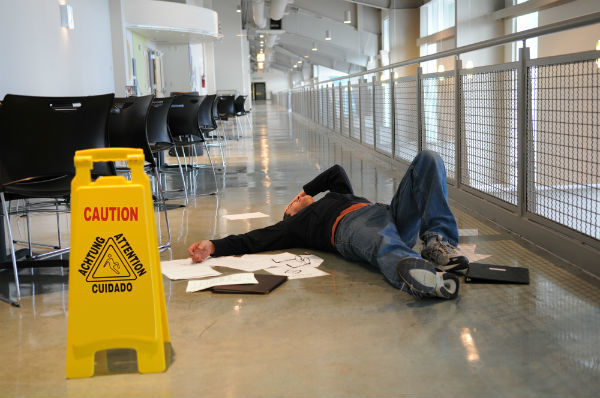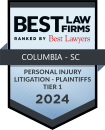
Falls are a common cause of injuries, and many falls are the result of people slipping or tripping because of hazards on other people’s property.
Some slip and fall accidents can cause very serious injuries that require lengthy terms of hospitalization and require several weeks or months of follow-up care. Many slip and fall accidents even result in death.
When you have a slip and fall accident on another person’s property in Columbia, the property owner may be liable for the injuries you sustained if the accident was caused by the property owner’s failure to repair or warn about a dangerous condition.
If you suffered severe injuries or your loved one was fatally injured in a slip and fall accident in the greater Columbia area, you need a clear understanding of your legal rights.
Our premises liability lawyers in Columbia can answer your questions and explain your legal options.
Founded in 1968, Joye Law Firm is an established Columbia, S.C. law firm. Our goal is to make a positive difference in the lives of the South Carolinians we serve.
Our attorneys bring to the table many years of legal experience to try to achieve a favorable outcome of your slip and fall claim. We have had the privilege of assisting many injured people in Columbia move forward after a serious accident.
Call (888) 324-3100 or contact us online to schedule a free consultation with an experienced Columbia slip and fall lawyer today.
Types of Slip and Fall Accidents in Columbia
A person could slip or trip and fall on a wide variety of hazards. A slip-and-fall accident may occur on public or private property.
Property owners including businesses and retail stores, apartment owners, and homeowners have a legal duty to make sure their property is safe for visitors and to provide adequate warning of hazards that cannot be repaired immediately.
Some of the most common causes of slip and fall accidents include:
- Wet, slippery flooring
- Cracked or uneven flooring
- Torn carpeting
- Electrical cords and wires
- Dirty and/or trash-covered floors
- Broken handrails
- Torn floor mats
- Potholes
- Defects in pavement
- Inadequate lighting
- Snow and ice
Most property owners will claim that any danger was apparent and that a victim should have been able to avoid it. This is rarely a good defense against a negligence claim.
Overcoming the defense requires the collection and presentation of evidence to prove a hazardous condition and the property owner’s negligence. An experienced Joye Law Firm premises liability attorney in Columbia can help you in building a compelling claim for compensation.
Common Slip and Fall Accident Injuries
Some slip and fall accidents cause people to fall particularly hard or possibly fall onto objects or from large heights. In these types of situations, an individual is far more likely to be seriously hurt.
Common kinds of injuries from slip and fall accidents include:
- Muscle strains
- Sprains
- Fractures
- Broken hips
- Internal organ injuries
- Nerve damage
- Spinal cord injuries
- Traumatic brain injuries (TBIs)
- Neck injuries
Serious slip-and-fall injuries may require extensive medical treatment and physical therapy at significant expense. Such expenses are difficult to pay because many victims cannot return to work.
In some cases, people’s injuries may be serious enough to cause permanent disabilities. A disabled individual may be unable to maintain gainful employment.
Some slip and fall injuries can also be fatal. In such cases, the family members of the deceased may have a right to file a wrongful death action against the negligent party or pursue workers’ compensation death benefits after a fatal workplace fall accident.
Proving Liability for Slip and Fall Injuries in Columbia, S.C.
Slip and fall accidents are an area of law known as premises liability. A premises liability claim is filed against a property owner who did not keep their property in a safe condition or failed to warn visitors about possible dangers.
A premises liability action entails the same four elements involved in most negligence claims:
- Duty of Care — A property owner has an obligation to visitors to keep their property in a safe condition or warn them about any hazards.
- Breach of Duty — The property owner breached their duty of care by failing to keep the property in a safe condition or warn about hazards.
- Causation — The breach of duty caused the victim to suffer injuries.
- Damages — The victim’s injuries resulted in damages.
Not all people are owed the same duty of care in South Carolina. The law divides visitors to property into three categories:
- Invitees — Individuals on a property by expressed or implied invitation of the owner, usually for the financial gain of the owner. Invitees are owed the highest duty of care. Customers in most retail establishments are considered invitees.
- Licensees — Individuals on a property with the owner’s consent, but often for their purposes. One kind of licensee would be a meter reader.
- Trespassers — Individuals on property unlawfully and without permission. Trespassers generally are not owed a duty of care except in special cases.
The law contains an important exception for instances when the trespasser who is injured is a child and the property owner has a swimming pool or trampoline that presents an attraction to children too young to appreciate the possible danger. In such cases, property owners can be liable for injuries when they did not secure their property to make the attractive nuisance inaccessible to children.
You should not assume that you cannot recover damages if you were partly responsible for your accident. In South Carolina, a person is allowed to recover damages as long as he or she was not more negligent than the defendant.
When a person is awarded damages, the damages will be reduced in proportion to their degree of negligence. In other words, a person awarded $100,000 in a Columbia slip and fall case but found to have been 15 percent at fault will have their damages reduced by $15,000 and ultimately receive $85,000.
Many slip-and-fall accidents are resolved through settlements, but some cases go to court. When a case goes to trial and a jury awards the victim compensatory damages, the compensatory damages are usually a combination of economic damages and non-economic damages.
Economic damages are tangible costs that can be calculated and proven, such as medical expenses, lost income, and property damage. Non-economic damages are much more subjective and cannot be proven, with such awards as loss of consortium, pain, and suffering, and emotional distress.
What to Do if You are Injured in a Slip and Fall Accident
After a slip and fall accident, seek a prompt medical evaluation, even if you feel unhurt. Not all symptoms of serious injuries are immediately apparent. A delay in treatment inevitably leads to an insurance company claiming that your injuries were not that serious or were caused at a later time.
When an accident happens in a business, you should be certain to file an injury report with the manager or the personnel office. You should also ask for a copy of the report.
Be sure to take as many photographs as you can of everything involved in the scene of your accident. You will definitely want to be sure to get multiple pictures of whatever caused your accident from different angles and distances.
If any people happened to see your accident, ask them for their names and phone numbers. When you cannot take these steps yourself, then ask a friend, family member, or neighbor to do this for you.
After serious accidents, the victims will often be contacted by insurance companies for the negligent parties. You should decline any request to make a recorded statement until you have consulted a lawyer.
Most insurers will have representatives attempt to get you to answer questions about your accident specifically designed to get you to make statements in which you admit negligence.
Some insurance companies may offer you a lump sum settlement to resolve your case under the guise that accepting it will let you keep more money for yourself. But this claim is disingenuous since the amount being offered is almost always much less than what victims are truly entitled to claim.
The attorneys at Joye Law Firm will negotiate for a just settlement that covers all of your past, present, and future losses. When an insurance company is unwilling to offer an adequate level of compensation, we will be prepared to file a lawsuit to seek justice for our client.

Contact Our Premises Liability Lawyers in Columbia
As soon as you contact Joye Law Firm, we will immediately launch an independent investigation into your accident. This can be important because some cases may involve multiple liable parties.
Did you sustain catastrophic injuries or was your loved one killed in a slip and fall accident in Columbia or a surrounding area of South Carolina? Do not wait to contact Joye Law Firm.
Every case has unique facts and past results are not predictive of future settlements or verdicts. But our firm’s record does show the strong efforts we make on behalf of clients to achieve positive outcomes.
Our record includes $478,000 recovered for a roofer who suffered multiple injuries including a brain injury after a fall and $465,000 recovered for a man who suffered a severe head injury after a fall from a ladder and many others.
You can have our lawyers provide an evaluation of your case by calling (888) 324-3100 or contact us online to schedule a free consultation.
Joye Law Firm Columbia Office Location
1333 Main St #260,
Columbia, SC 29201
(803) 618-4189




























